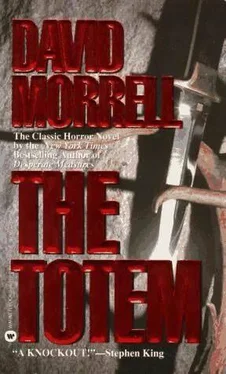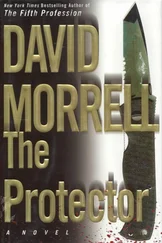David Morrell - The Totem
Здесь есть возможность читать онлайн «David Morrell - The Totem» весь текст электронной книги совершенно бесплатно (целиком полную версию без сокращений). В некоторых случаях можно слушать аудио, скачать через торрент в формате fb2 и присутствует краткое содержание. Жанр: Триллер, на английском языке. Описание произведения, (предисловие) а так же отзывы посетителей доступны на портале библиотеки ЛибКат.
- Название:The Totem
- Автор:
- Жанр:
- Год:неизвестен
- ISBN:нет данных
- Рейтинг книги:4 / 5. Голосов: 1
-
Избранное:Добавить в избранное
- Отзывы:
-
Ваша оценка:
- 80
- 1
- 2
- 3
- 4
- 5
The Totem: краткое содержание, описание и аннотация
Предлагаем к чтению аннотацию, описание, краткое содержание или предисловие (зависит от того, что написал сам автор книги «The Totem»). Если вы не нашли необходимую информацию о книге — напишите в комментариях, мы постараемся отыскать её.
The Totem — читать онлайн бесплатно полную книгу (весь текст) целиком
Ниже представлен текст книги, разбитый по страницам. Система сохранения места последней прочитанной страницы, позволяет с удобством читать онлайн бесплатно книгу «The Totem», без необходимости каждый раз заново искать на чём Вы остановились. Поставьте закладку, и сможете в любой момент перейти на страницу, на которой закончили чтение.
Интервал:
Закладка:
NINE
Everything was speeding up. The medical examiner didn't have the time to think things through, to make sure that he did things properly. When Owens left to take the dog down to the clinic, for example, he himself had stayed behind to calm the owner. All the while he stood there talking with the man, at last walking with him toward the house, the medical examiner wanted to rush through the streets to get to Owens and to watch him do the tests. At the same time, he was thinking that he ought to get in touch with Slaughter, to tell him what was going on. But what was going on? He didn't know yet. There was nothing positive. For all he could predict, the tests would indicate some other problem, and he didn't want to trouble Slaughter, didn't want to bother him without a reason. So he'd gone inside the house and stayed there briefly until he'd reassured the owner. Then he hurried from the house ("Don't go out in the backyard. You could be infected by the doghouse or the chain.") and frantically realized that he'd left his car at the hospital. He ran through the backyard of the house next door. The man in tennis clothes came out to tell him, "Hey, if I'd wanted people cutting through here, I'd have put in a sidewalk." But the medical examiner didn't answer. He simply clambered up the fence and jumped down on the other side, racing through the long grass toward the trees and then the dry creek. He no longer cared about the snakes or other things that might be hiding there. He thought only about his car, about the tests that Owens soon would be performing.
He scrambled from the dry creek, through the trees and bushes toward the fence that he had toppled, jumping across the ants' nest, running to reach his car. But as he stood there, breathing hard, fumbling in his pocket for his keys, he suddenly remembered the objects in the trunk of his car: the plastic bags, the dead cat, and the blood-soaked dirt. How much danger did they pose? He couldn't take the chance. They might be so contaminated that they'd spread the disease. Until he had time to examine them, he needed to make sure that they were safely stored in medical-waste containers.
The process took twenty minutes. Only then was he able to hurry to his car and speed away. He swerved up the driveway toward the back of the veterinary clinic. The sun had set now. In the darkness, except that the rear doors were closed and Owens' van was parked before them, this was much like when he'd come here Friday morning, seeing old Doc Markle dead and staring at the mangled steer, when everything had started for him. He skidded to a stop beside the van and jumped out. He gripped the door beside the two big double-doors, and Owens hadn't locked it. As he rushed inside, he squinted from the blazing lights and was mindful once again of Friday morning. Had it started only yesterday? He saw the dog up on the table, a protective plastic sheet beneath it, Owens there beside it in his lab coat and his face mask.
Owens turned to him, his voice muffled by the face mask. "The dog was dead before I got here."
"Is that common?"
"Sometimes the paralysis can set in very quickly."
The medical examiner understood what Owens was referring to. An animal with rabies would go through several stages. First it acted normally until the virus worked along the nerves. Then the brain became infected, and the victim was excited, furious. At last the virus spread back through the total nervous system, and the animal was lethally paralyzed.
"But I saw it in the active stage. Several hours later, and it's dead? Paralysis shouldn't be that quick."
"Maybe. I agree with you. This could be something else," Owens said. "You'll find a coat and face mask in that locker over there."
The medical examiner went across to get them, also finding a pair of rubber gloves. He put them on, and he was conscious of the buzzing lights up in the ceiling as he walked back to the table.
"First, let's get this collar off." Owens fumbled to unsnap it, staring at the battery attachment. "What I'd like to do to that guy." He set it aside. "You ought to meet some people who come in here, wanting us to make their dog mute, cut its voice box out, its vocal cords. Hell, I'd like to cut on them. At least they wouldn't talk so much then. And they wonder why a dog without a voice will bite somebody when it's got no other way to warn him off." Owens' face was red above his mask. He shook his head. "Well, let's get to it."
"How can I help?"
"I need that scalpel."
Four quick strokes, and Owens peeled the scalp off. They stared at the blood-smeared skull.
Then the drill. Owens flicked the switch. The bit was whirring, grinding through the bone. Four holes, widely spaced to form the corners of a square. And then the saw. Owens used it neatly, its motor buzzing as he cut from one hole to another, swiftly, gently, not too deeply. Then the job was done, and he was prying at the skull bone.
"Well, the brain is swollen and discolored. You can see that slight pink color. Indications. On the other hand, distemper sometimes looks like that. I need to take the brain out and dissect it."
The medical examiner again handed him the scalpel, then forceps, and Owens placed the brain in a glass dish on the table.
"Ammon's horn," the medical examiner said.
"That's right." Owens cut past the hippocampal region. Then he had it. "You can do the slides."
"Which way do you want them? Pressed or done in sections?"
"The sections take too long. Just do impressions. What we're looking for will show up just as well."
So the medical examiner, instead of placing tissue from that portion of the brain into fixing fluid and embedding it within paraffin, a process that took several hours, simply pressed a bit of tissue on the slide and smeared it evenly, then looked around to find a microscope.
"Over by that cabinet."
The microscope had ajar of Seller's stain beside it. The medical examiner put stain across the specimen to make sure that what he was looking for would stand out in contrast. He arranged the slide and peered down through the lenses.
"Can you see them?" Owens asked.
The medical examiner kept peering.
"What's the matter? You should see them."
But the medical examiner just turned to him and shook his head. "I think you'd better look."
"You mean you didn't see them, and we have to do the other tests?"
"I mean that you should have a look."
Now Owens frowned as he peered down through the lenses.
What the medical examiner had looked for was some evidence of Negri bodies. Negri was a scientist in Italy who first identified them in the early 1900s. They were tiny, round, and sometimes oval bodies in the protoplasm of the nerve cells in that portion of the brain called Ammon's horn. No one knew exactly what they were. In current theories, they were either rabies virus particles, or else degenerative matter from the cells affected by the virus. Maybe both. But seeing them was certain proof that rabies was at work here. And the medical examiner had seen them. On the other hand, he maybe hadn't.
"I don't get it," Owens said. "Something's wrong here. These things shouldn't look like that."
The medical examiner understood. He watched as Owens peered down through the microscope again. Because the things he'd seen were neither round nor oval. They were oblong with an indentation on one side.
"They look like god-damned peanuts," Owens said. "What's going on here?"
"This could be some related virus."
"What? You tell me what."
"I just don't know."
"You bet you don't, and I don't either. Rabies is something I'd recognize, and you can bet there's nothing in the books about these things we're looking at."
"We'll have to do the antibody test."
"It takes a couple of hours, and the mouse test takes at least a week. I want to know what this thing is."
Читать дальшеИнтервал:
Закладка:
Похожие книги на «The Totem»
Представляем Вашему вниманию похожие книги на «The Totem» списком для выбора. Мы отобрали схожую по названию и смыслу литературу в надежде предоставить читателям больше вариантов отыскать новые, интересные, ещё непрочитанные произведения.
Обсуждение, отзывы о книге «The Totem» и просто собственные мнения читателей. Оставьте ваши комментарии, напишите, что Вы думаете о произведении, его смысле или главных героях. Укажите что конкретно понравилось, а что нет, и почему Вы так считаете.












